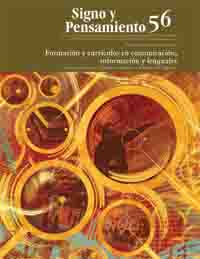Abstract
The concept of curriculum has been viewed from two points of view. The first one is an abstract rational perspective, and the second one is based on cultural construction. On the one hand, this work analyzes the theoretical set-up of the latter, bearing in mind Habermas’s cognitive interests theory, the critical theory of education by Carr and Kemmis, and the pedagogy of the oppressed by Freire, all of them summarized by Shirley Grundy. On the other hand, it analyzes the contributions by action research and negotiation as facilitators of critical and participatory curriculum construction.
Carr, W. y Kemmis, S. (1986), Becoming Critical. Education, Knowledge and Action Research, London, Falmer Press.
Ewert, G. (1991), “Habermas and Education: A Comprehensive Overview of the Influence of Habermas in Educational Literature”. En: Review of Educational Research, vol. 61, núm. 3.
Freire, P. (1970), Pedagogía del Oprimido, México, Siglo XXI.
García de la Peña, J. (2003), Getting to Yes. El arte de negociar sin ceder, [en línea], disponible en: http://www.gestiopolis.com/recursos/ documentos/fulldocs/ger/gettingtoyes.htm, recuperado: mayo de 2010.
Grundy, S. (1987), Curriculum, Product or Praxis?, London, The Falmer Press.
Habermas, J. (1984), Ciencia y técnica como ideología, Madrid, Tecnos.
Núñez V. et al. (2005), “Diseño de un Currículo de Lengua Materna para la Pontificia Universidad Javeriana, desde una Perspectiva Crítica” [informe final de investigación], Bogotá, Pontificia Universidad Javeriana, Facultad de Comunicación y Lenguaje.
Posner, G. (1998), Análisis de Currículo, Bogotá, McGraw-Hill International.
Sánchez, W. (2009), “Política de Educación Lingüística y Currículo en Lengua Materna en la Universidad” [Resumen de ponencia], Bogotá, X Congreso de investigación, Pontificia Universidad Javeriana.
Santos, D. et al. (2000), “Propuesta Curricular General para la Enseñanza de Lenguas Extranjeras en la PUJ (PCGLE)” [informe final de investigación], Bogotá, Pontificia Universidad Javeriana, Facultad de Comunicación y Lenguaje.
This journal is registered under a Creative Commons Attribution 4.0 International Public License. Thus, this work may be reproduced, distributed, and publicly shared in digital format, as long as the names of the authors and Pontificia Universidad Javeriana are acknowledged. Others are allowed to quote, adapt, transform, auto-archive, republish, and create based on this material, for any purpose (even commercial ones), provided the authorship is duly acknowledged, a link to the original work is provided, and it is specified if changes have been made. Pontificia Universidad Javeriana does not hold the rights of published works and the authors are solely responsible for the contents of their works; they keep the moral, intellectual, privacy, and publicity rights.
Approving the intervention of the work (review, copy-editing, translation, layout) and the following outreach, are granted through an use license and not through an assignment of rights. This means the journal and Pontificia Universidad Javeriana cannot be held responsible for any ethical malpractice by the authors. As a consequence of the protection granted by the use license, the journal is not required to publish recantations or modify information already published, unless the errata stems from the editorial management process. Publishing contents in this journal does not generate royalties for contributors.


